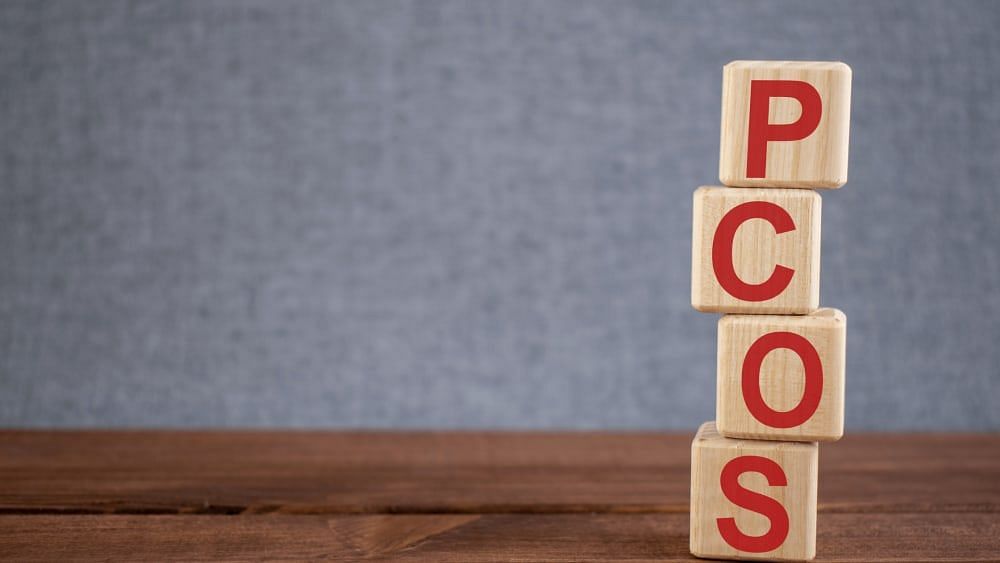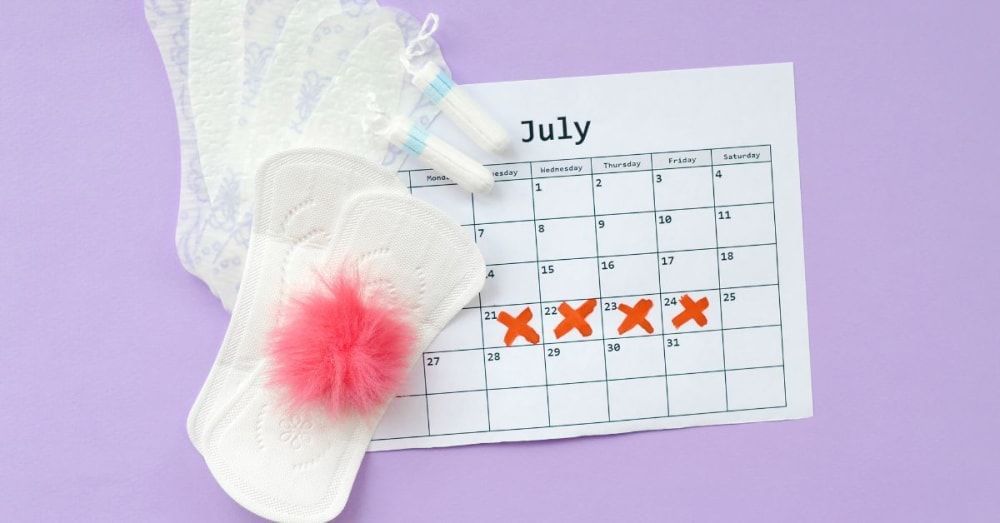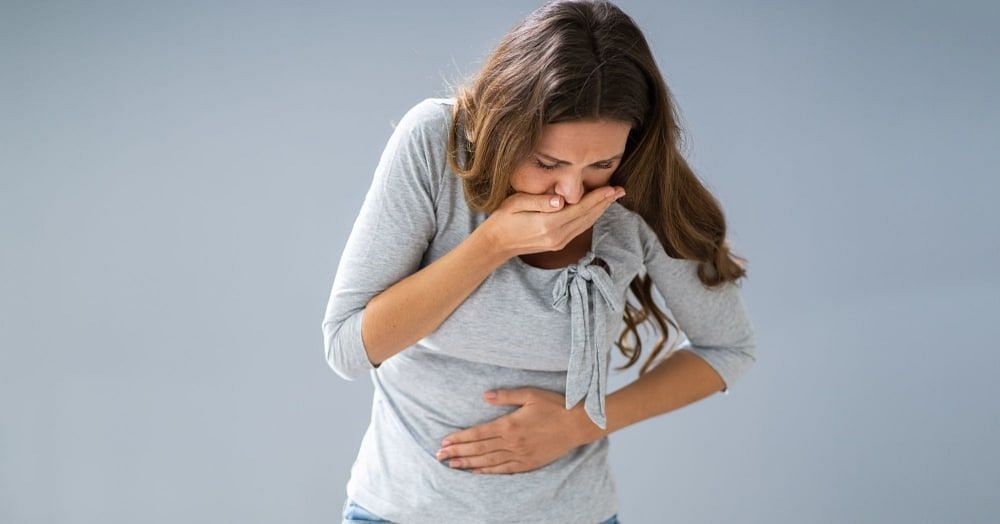PCOS, or Polycystic Ovary Syndrome, is a women's health problem caused due to hormonal imbalance, occurring in women who come in the age bracket of 15-44 years.
Women with PCOS release more than what is considered a normal amount of male hormone i.e., testosterone which causes a hormonal imbalance in the body. This imbalance can lead to acne, excess hair growth, scalp hair loss, etc. These hormonal changes also cause irregularities in your menstrual cycle.
PCOS affects the functioning of the ovaries. Ovaries are responsible for producing estrogen and progesterone hormones which help regulate the period cycle.
Generally, the egg is released from the ovaries which matures after 15 days of getting period, which helps continue the menstrual cycle. In PCOS, the egg is not released during ovulation and does not mature properly, which results in delayed PCOS menstrual cycle. In some women there are more eggs formed and trapped in the ovaries forming cysts.
This is why it is called Polycystic Ovary, where Poly refers to many, and cystic means cysts. In simple terms, it means many cysts are created in the ovaries.
Most women who have PCOS are not even aware of this problem. This condition can lead to long-term diseases such as diabetes, infertility, and heart problems.
Who Gets PCOS, and Why?
- Women who are unable to conceive a child may have PCOS. As per a study, 50% women remain undiagnosed and may come to know of the condition when consulting for infertility.
- In many cases, women get PCOS due to hereditary causes. If someone in your family has had PCOS, then you might be at risk of getting the condition once you cross puberty.
- Obese women are also at the risk of PCOS.

Why do women get PCOS?
The reasons for getting PCOS are not 100% certain. Various aspects can cause PCOS. Some of the probable reasons that cause PCOS are as follows:
- Heredity can cause PCOS
- Poor lifestyle can cause PCOS
- Wrong diet can cause PCOS
- Stress can cause PCOS
- Lack of sleep can cause PCOS
- Obesity can cause PCOS
- Plastic packed food can cause PCOS, as it contains chemicals and fertilizers.
What are the symptoms of PCOS?
Some symptoms of PCOS are infertility, obesity, a higher level of androgens in the body, high level of insulin, hair loss, and sleep disturbance, infrequent periods or prolonged periods causing PCOS heavy bleeding and clotting are some symptoms.
Can I have PCOS with regular periods?
Yes, you can have PCOS with regular periods. Irregular periods are not the only symptom that suggests one has PCOS.
Having regular periods with PCOS is possible. Some women may have regular menstrual cycles but a high level of androgens (male hormone) in the body can indicate presence of PCOS. This is called Hyperandrogenism.
In such a situation, their periods may be regular but the ovulation cycles are highly disturbed. Regular period does not guarantee occurrence of ovulation. This is one of the symptoms of PCOS with regular periods.
There may also be situations where women who experience anovulatory cycles may not experience premenstrual symptoms like period cramps, soreness, tender breasts, etc.
Thus, it becomes essential to consult a doctor and take a test to ensure if you have PCOS or not.

Can I get pregnant with PCOS and regular periods?
Yes, you can get pregnant with PCOS. Infertility, although common, is one of the treatable symptoms of PCOS.
Even though one may have their periods regularly, one can still face problems with their pregnancy. It is a known fact that conceiving can be difficult, but not impossible for women suffering from PCOS.
Some ways to increase chances of pregnancy in PCOS are:
- Losing weight or working on obesity by adopting a healthy diet and workout regime can improve one’s chances of pregnancy.
- There are many PCOS medicines for irregular periods. Some prescription medicines such as Clomiphene (Clomid) can help the ovulation process.
- In Vitro Fertilization: In case medicines do not work, this is the next option. Here, the egg is fertilized with your partner’s sperm in a lab and then placed back into the uterus. This has a higher success rate.
- Surgery: This is usually the last resort. Lasic treatment is done to drill a hole on the surface of the ovary which restores ovulation, although it is only beneficial for 6-8 months.
Do consult your doctor before adopting any of the methods.
Are irregular periods and PCOS linked?
PCOS is a condition which disrupts the balance in reproductive hormones. This disruption creates problems for the ovaries. Women’s ovaries release eggs every 28 days as part of a healthy menstrual cycle.
Having extended, infrequent or irregularity in periods is one of the most common signs of PCOS. Having less than eight periods a year is also one of the signs. Some women may also experience periods every 21 days which can indicate the same.
If you are facing PCOS irregular periods issues in your menstrual cycle, do consult a doctor for proper guidance.

How can I naturally regulate my periods with PCOS?
These are some natural treatments for PCOS to get periods and regulate your monthly cycle:
- Maintaining a healthy lifestyle is the most effective method to treat your irregular cycles.
- Eat a healthy diet filled with essential nutrients.
- Maintain your weight and indulge in some physical activities daily.
- Avoid eating junk food and eat more home-cooked food.
- Stay away from smoking and drinking alcohol.
- Get quality sleep every day.
Some Home Remedies to treat PCOS
Some medicines and tablets such as birth control pills and diabetes drugs can help you get normal periods regularly. But these medicines are bound to have some side effects. If unsure, it is necessary to consult a doctor for the same.
Some remedies you can try at home without taking any medicines and tablets are as follows:
Maintain a healthy diet to treat PCOS:
You should eat a healthy balanced diet everyday. Try to avoid food that is packaged as they contain harmful preservatives. Eat more fermented food like curd, paneer, sprouts etc. Consume fresh seasonal fruits and vegetables from local vendors. You should avoid buying food from supermarkets as they may contain preservatives.
Follow an active lifestyle to treat PCOS:
- Lose weight by exercising daily. Some suggested exercises would be swimming, jogging, brisk walking and cycling for PCOS. Doing yoga can also help.
Sound sleep to treat PCOS:
- Avoid irregular sleep patterns and get a good amount of sleep every day. It is essential to get at least 7 hours of sleep.
Avoid contact with chemicals:
- Say no to plastic-packed eatables because when plastic comes in contact with food it releases chemicals into the food. Try eating in steel vessels rather than plastic plates. Carry steel tiffins to your office and ditch your plastic tiffin.
Also Read: Ayurveda Treatment for PCOS
Conclusion
There is no certainty about what causes PCOS. The reasons can be heredity, poor lifestyle, stress, obesity, unhealthy eating habits, amongst others.
Every 1 in 10 women of childbearing age is diagnosed with this disease. This disease, if not taken care of, can cause serious illnesses such as diabetes, heart diseases, endometrial cancer, infertility, obesity, etc.
Adopting a healthy lifestyle by incorporating quantified nutrition to lose weight, in turn getting rid of obesity, cutting down on things that cause stress, exercising, etc. can immensely help reduce the impact of PCOS and also help prevent the onset of other diseases.
Sources
https://nabtahealth.com/i-have-regular-periods-could-i-still-have-pcos/
https://www.womenshealth.gov/a-z-topics/polycystic-ovary-syndrome#11
https://www.contemporaryobgyn.net/view/diagnosing-pcos-women-who-menstruate-regularly
https://academic.oup.com/humrep/article/15/1/24/702011












